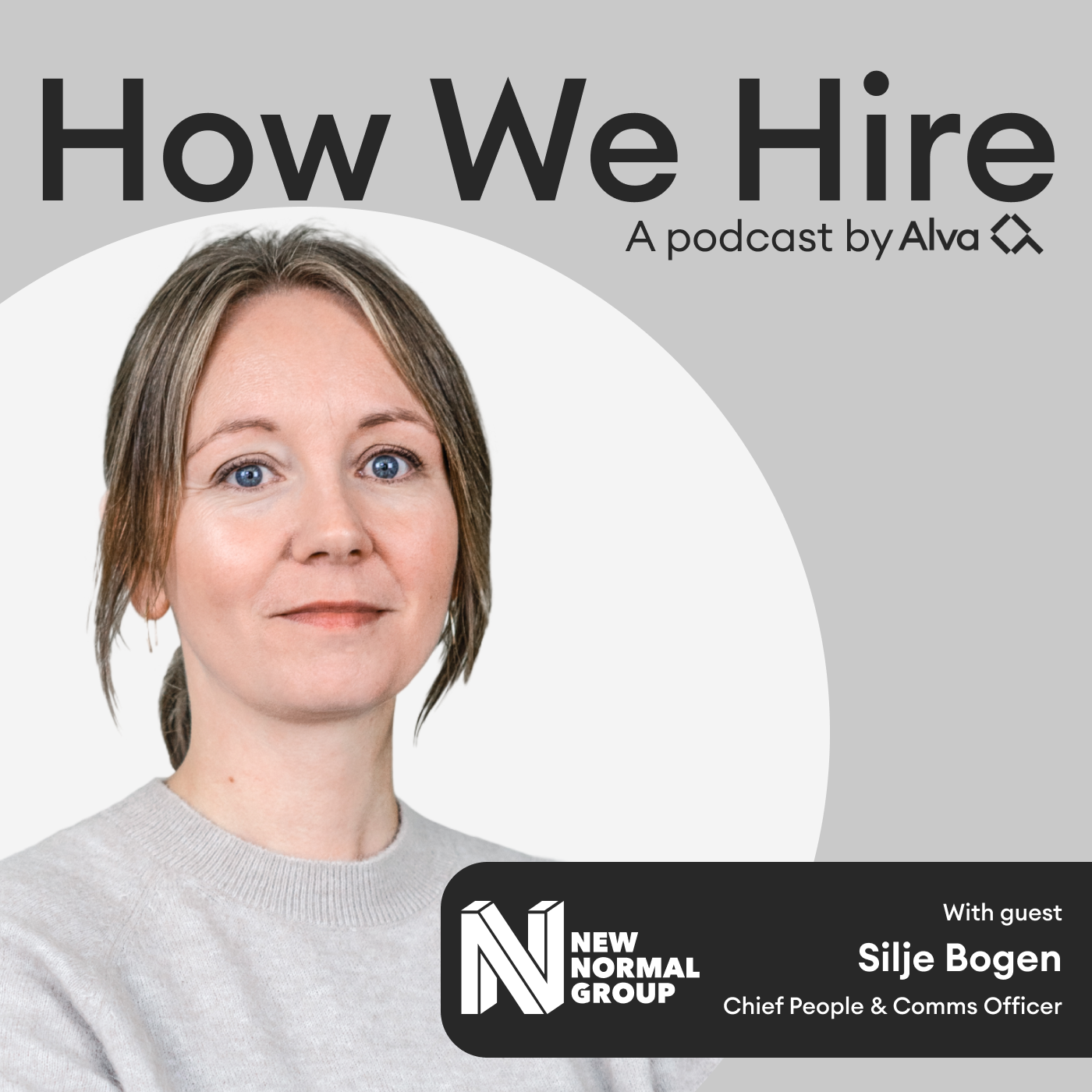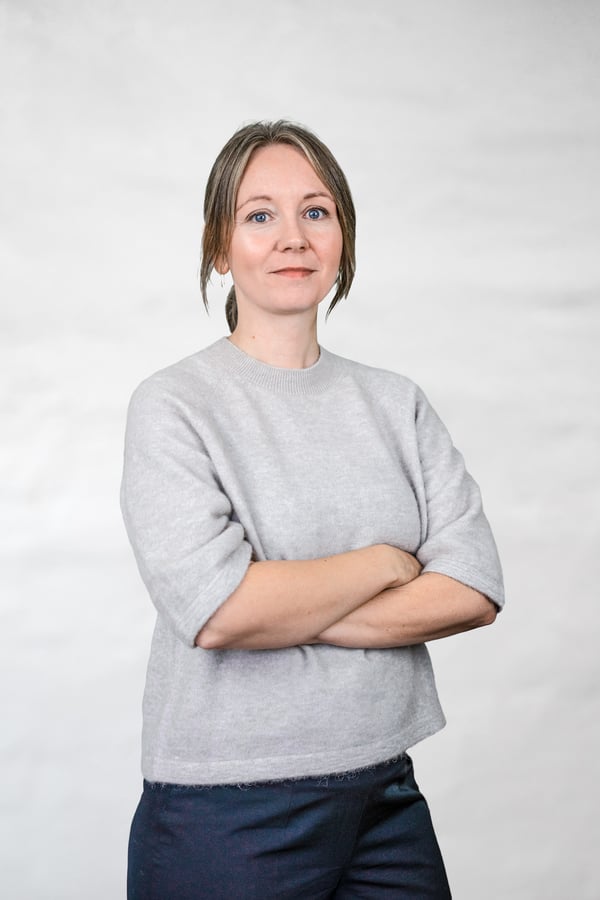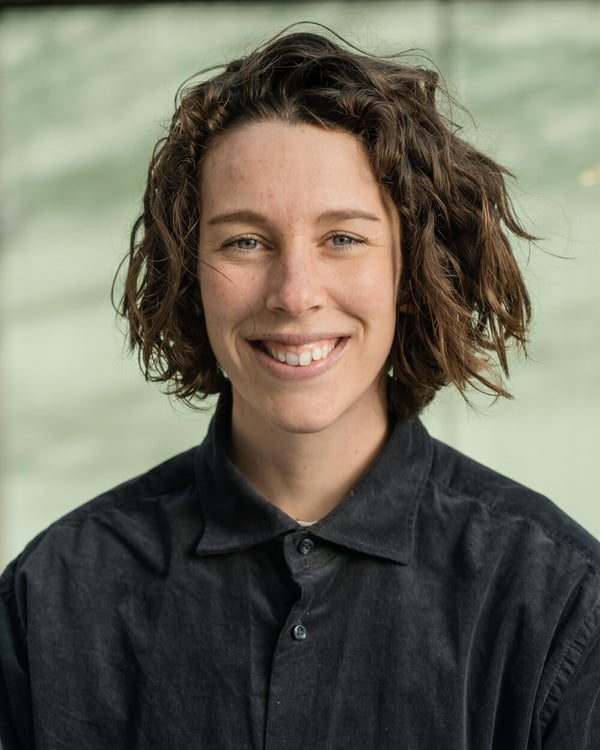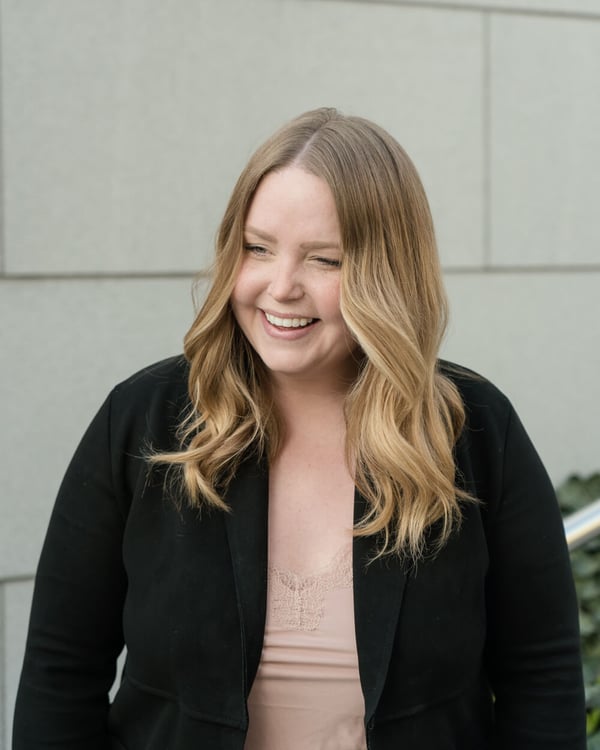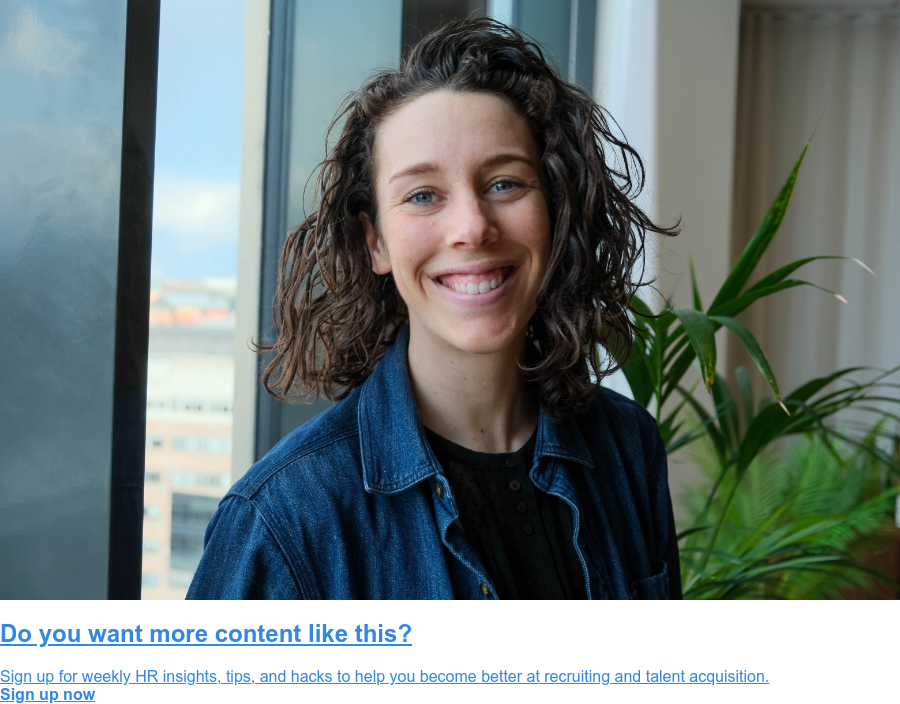How We Hire Podcast: Episode 9 Transcript
Linnea Bywall (00:06):
Welcome to How We Hire, a podcast by Alva Labs. With me, Tove Hernlund and me, Linnea Bywall. This show is for all of you who hire or just find recruitment interesting. Every episode we will speak to thought leaders from across the globe to learn from their experiences and best practice within hiring, building teams and growing organizations.
Tove Hernlund (00:31):
Welcome to another episode of How We Hire. I'm your host Tove, events and community manager at Alva Labs.
Linnea Bywall (00:38):
And I'm Linnea, head of people here at Alva Laps.
Tove Hernlund (00:41):
And our guest on today's episode is Silje Bogen. Silje has a masters in organizational psychology and over 15 years of experience within the people at HR Sphere. She is a partner and shift people and communications officer at New Normal Group, an entrepreneurial group focusing on supporting and helping build innovative software startups and scale ups. Welcome to How We Hire, Silje.
Silje Bogen (01:04):
Thank you, Tove. So I'm super excited to be here.
Tove Hernlund (01:06):
We're really excited to have you here as well. And starting off before anything else, something that I've heard you say that I think we need to dig a little deeper into is that you really prefer the term people over HR, how come?
Silje Bogen (01:21):
Over the years people have always told me that I'm an atypical HR person and at some point I ask, "What do you mean by that?" And they answered, "Well, you always link everything you do to the overall business strategy. You seem to think more like a financial controller than an admin person. You always ask us all these difficult questions that force us to rethink our plans." Now this sparked an interest in me because I was under the impression that every HR person operated like this. I really believe that every or most, at least HR professionals, they aim at supporting their company in reaching their overall goals and that they think of their role as business critical as affecting business outcomes. But it occurred to me at some point that perhaps we have different strategies for doing just that. And for me over the past few years, this has led me to divide the traditional field of HR into three areas, where the focus area or the focus is a little different and the competencies that you need to succeed are different.
Silje Bogen (02:23):
And these three areas for me have been personnel administration, which is payroll, it's the reporting of sick leave, following up on absence, the paperwork of HR perhaps. And then you have operational HR, which to me is legal compliance, establishing routines and uphold them, securing efficiency, processes I would call it. And then you have people which is more about how do we bring an organization for growth. It's about effectiveness and how we can develop both in terms of the organization overall but also in terms of each team member. I normally call it psychology in the workplace. I think you could also, perhaps now that I think about it, call these three areas the what and the how and the why of an organization, where I prefer to focus on the why aspect. This is just an idea that I have, I'm sure there are smarter people out there who have better and more elaborated thoughts on this and I would love to hear from them. But this is what I mean when I differentiate people from HR.
Tove Hernlund (03:24):
And I think this is super interesting and I think my learnings, I don't have a traditional HR background either. I'm a psychologist and I've come to realize I don't think anyone has a traditional HR background anymore. It is such a wide field where a lot of different strategies or way to tackle the field makes a ton of sense based on the company. And I think building on that would be interesting. As you now work at New Normal Group, work as an incubator, you must see so many different organizations and how can you, as an incubator, help them when it comes to people, the what and the how and the why in people?
Silje Bogen (04:12):
For me, it boils down to understanding the unique business idea and the business model of each of these organizations that we have or companies that we built, which phase are they in and identify the unique needs that you have in different phases because I believe that a very early startup they have different priorities, they have different competency needs than from a more mature startup or even a scale up will have. So it's identifying where are we now, where do we want to go and what do we need in order to do that? And for me, when I focus on the people function or the why of an organization, it's really about not just looking at HR in a traditional way or focusing only on our people, even though I use the word people, I'm lacking that good word for what it is that I try to do for a living.
Silje Bogen (05:04):
But it's really about all the processes we have that support the growth of each team member and the team and organization itself. And that it boils down to processes, routines, systems, frameworks, communication, leadership style, management style, all of these things need to be viewed together through the lens of where are we now and where do we want go, how do we support overall overarching company goal, vision, strategy and pointing to everything we do so that it actually lend supports to that growth journey
Tove Hernlund (05:37):
I draw is that everything, your strategies around people, what everyone's called the field, will be really tightly linked to where you are in the journey and it will change. Based on your long experience here, why is it important to implement the people function really early in the company journey?
Silje Bogen (05:59):
I would say that there are a few things that make it important to have a people function early on in a company and that this is also where it's important to split between a traditional HR or operational HR, I think, and people because sometimes depending on where you are and where you want to go, you have to prioritize one or the other sometimes. But if we're talking about the people function in the way that I've outlined it here, at least, it's three things that I want to highlight. And one of them is in our complex world, one of our biggest competitive advantages is leveraging the combined strength of the people that have chosen to work with us every day. Their skills and their perspectives, looking at it from our first few hires, we need to make sure we're getting the right competence in early on.
Silje Bogen (06:42):
I think that is more crucial for an early startup than for more mature companies, where you can afford spending more time on having specialized people and we need to onboard them in the best possible way for them to positively impact our bottom line as quickly as possible and thrive in our company and want to stay. And also that we build our teams with a focus on optimal performance. It's really important that a team, in an early stage startup, functions very well.
Tove Hernlund (07:13):
I think this is super interesting and one thing that you mentioned is that it's more important to get the right people in an early stage startup than in a larger organization where you can afford more like specialization. First I want to like why, but then also, of course, how? So why is it more important early stage to get the right people?
Silje Bogen (07:35):
It's always extremely important to get the right people in that can help us grow, of course. I've stopped looking for, remember like 10 years back we would look for people who would fit into our organization. I don't look for organizational fit anymore, I look for organizational contribution. People that bring something that we lack and that we really need and, of course, that's important for any organization that I believe that in a startup you have very limited resources. You very often have to operate on a very small team. So people have to be able to and willing to and thrive on having to deliver across your delivery line in a much greater or at least a broader way than you have to in a bigger team where you can have specialized people with competency in some very different areas. It's this rolling up your sleeves, getting things done attitude that you need to have.
Silje Bogen (08:27):
And then when you think about it like that, for me at least, of course you hire for someone who has the skill that you need, but the skillset is so broad so you really need someone who also tries so that flexibility on that challenging, juggling a lot of different projects at the same time. And one bad seed in a very small vulnerable organization as a startup very often is, it costs that much more and it's that much of a bigger risk I think to the growth journey than when you have a bigger team that can leverage any pitfalls that you might have or lacks of competence.
Tove Hernlund (09:03):
So there's no support system, so if something doesn't work out, it's going to be really visible.
Silje Bogen (09:10):
It is. And it might hurt a lot more if you're three or four people, whereas maybe you're 14 or ton of people where other people can pick up the slack where other people have a different set of competencies and skills to solve a problem.
Tove Hernlund (09:24):
And as you say, of course, it's always going to be super important but there's no slack in the system early on. So we know that it's super important so how do you advise the companies that you guys work with to do it?
Silje Bogen (09:39):
The first thing is to really understand what is it that we need right now in the phase that we're, what are the challenges that we need to solve? What are the areas of responsibility we need someone to hold or what are they that we need someone to hold on to? And what's the strengths of our current team and where do we lack competence or focus or power? Myself for example, I'm this person who has a lot of ideas and I like to challenge the status quo and come up with new ways of doing things. So when I hire someone to work closely with me, it needs to be someone who likes catching all the balls and ideas that I throw up there and just run with it and execute on that. And I need to know that as a leader in order to make and build great teams that can actually deliver something of value.
Silje Bogen (10:31):
I think it starts there, what is it that we need? What do we already have and how can someone come in and contribute with something that we're actually lacking? So that's a first analysis and, of course, we could spend three days just talking about that phase, but on an overall topic area that that's a quick analysis and then you have to do what I like to call research based recruitment. It's really hard trying to have a predictive validity on your recruitment processes and I think, especially in an early or in startups and early phase scale ups because it takes a lot of time and it can cost a little bit of money and resources to do, but it really helps you make sure that you get the right people in that contributes that can quickly start running and producing and thereby affecting your bottom line. So we try to use methods that help us predict job delivery future performance that could of course be testing and it could be standardized interview processes, all of these things that we know but sometimes in software startup world you have to be pragmatic as well.
Silje Bogen (11:40):
And then it's something about understanding how people are different. We have different needs, we have different ways of organizing our work, making decisions, utilize information. And as a manager sometimes when you have to be more pragmatic and you cannot be that picky in a recruitment process, you need to make the best of it. And I believe that coaching our managers and our CEOs, then, on how do you make sure that you see the individual that you've hired as an individual that has unique needs and unique ambitions. How do you support that individual in contributing with something that we need in our current space right now?
Tove Hernlund (12:15):
There's so much I want to dive into and if it's okay, I would actually like to, as you said, we can talk three days about the analysis phase, but I think what's interesting then is so say that you're trying to understand the current team and what the current needs, how do you do that in a startup where you might not even know what the product is going to be?
Silje Bogen (12:37):
That can be really hard and sometimes we make an assumption and it's completely wrong, but I think that's the beauty of having a group, as we have as well, because we've fallen into pitfalls time and time again and we've made mistakes and we have some wins as well and every time we make a mistake we learn. So that helps. But I would say that it's really about thinking because what you need to do, of course, is to have a business idea. You need a where are we going, what is it that we want to do, what are our goals, what is our vision? What is the product that we want out there? I'm not going into the whole product line, but once you have that, when you're ready to hire someone, it's about finding, to me at least, it's about identifying the strengths that we already have on the team.
Silje Bogen (13:22):
And as part of the New Normal Group, each and every one of our companies, they have access to the resources that is already within the group. So they have access to myself for example as a people person and my colleague, Alexander, who's really good at business modeling and finances and those type of things. So we start by mapping out what set of competencies do we already have and where's the gap? What is it that we need for this unique company? If that is an eCommerce platform or that is a product realization company or if that is a women's health tech company, you will need different competencies based on where you are and where you want to go.
Tove Hernlund (14:01):
You said sometimes we think we know what they need and then we miss it and we make mistakes. I think all recruiters can relate to that feeling, what would be your early signals that you're on the wrong track?
Silje Bogen (14:17):
I think very often it's something that you would get a sense of during the interview process where if you don't get the answers to the challenges that you have there, there's something in our spec, in our job description and job posts that is not really, we haven't been able to story tell exactly what it is that we actually need and perhaps that's because we haven't really gotten it under our skin ourselves, what is it that we're lacking here in order to succeed? But it's really hard because when you spec a company in an early phase, you might need something for a very short process or period of time only because you run really fast. And what we try to do, of course, is to build growth companies with a very high growth trajectory. You don't want that growth to be very slow. I think that is, when we say startup, it's not just every company that has been started, it's those with a high growth pace.
Silje Bogen (15:12):
So it's really hard because what we need today can be quite different from just a few weeks into the future. Two months from now we might need something very different. Like I try to talk about earlier, if you don't only focus on their hardcore skills, if you need someone within marketing, don't just look at how good are they at doing growth marketing, digital marketing, whatever it is that is their field of expertise. But if it's a company that delivers products or projects to customers as well, look at the overall communication skills, you need that customer-centric mindset. You need flexibility and the ability to turn around really quickly. You need fundamental business understanding because it is different to work in a startup than a more mature bigger company. You need to be able to thrive on high energy, high pace work environment. And when we say that in a startup, we really mean it.
Tove Hernlund (16:07):
Linnea, on this topic, since you've been a part of growing Alva from a very small to a, at least, a scale up size of 80 plus people now, how have you worked to identify all of these things that Silje now talking about in terms of not going for hard skills, focusing on soft skills, maybe focusing on the overall mindset, what's your kind of insight into avoiding those mis-hires as well?
Linnea Bywall (16:32):
I think the short version of how we have built Alva is that early on we needed a lot of generalists. We needed great people that could do a lot of different things because as we grew they would grow and do different things. I've had five different jobs at Alva in three and a half years. And so I think it's a lot about finding the right people. So hiring based on who they are as individual, their soft skills, hiring really ambitious, goal oriented driven people, really smart people. So the way that we've done that has been by assessing their personality and logic ability traits to see if they have those core aspects of who they are, that will suit with this generalist role. So really using standardized and scientific methods to target what is actually linked to job performance. And then I think ask the company has grown, it's about finding that balance between always striving for potential but also daring to add more and more specialization.
Linnea Bywall (17:42):
So now when we're like, as Silje said, 80 people, we have obviously more defined roles where you will be in this role and this is the scope is defined and the scope will,, to some extent remain more or less the same for at least a longer period than it used to be. So I think it's potential has been crucial and always will be, but it's also the extra piece of the puzzle with the hard skills will get more and more room in the process even though we never want to lose part of this core. So it sounds similar to what you're describing and that makes me think, so what does your process look like to identify those people that are the right people and not necessarily just the right CV?
Silje Bogen (18:33):
So we have 14 companies in our portfolio today in different phases, so the process is a little different for each of them because of their different perspective and their different needs. As much as we can we try to use for example, cases, case assignments, in order to see how people think. The beauty of case assignments, in my mind, of course, is that there's very rarely one correct answer. There are so many ways of solving a case and things that you choose to focus on, tell us a lot about who you are as a person and how you function in the workplace.
Silje Bogen (19:09):
The way you choose to present it tell us a lot about how do you involve others and communicate, which I think is really crucial in a building phase. Another aspect is training our recruitment managers in looking for different things, especially if you have a very specialized recruitment manager, if you have a growth marketer who needs someone on their marketing team, just making them reflect around what are the other aspects of your job, what other things than just producing marketing is it that you do that make you succeed or make you not succeed? Who are on your team to date? The great ones, what is it that they are great at besides the marketing field of expertise? And look for this in candidates and people that they talk to. In addition to, of course, this analysis of the team. What are we good at today? What do we have strength in and where are our challenges and where do we lack competence or focus?
Tove Hernlund (20:00):
Do you do different cases for each type of company, so that's super specialized? Are there aspects that you always use? Tell us a little bit how you run that.
Silje Bogen (20:10):
They're typically very specialized because we want to showcase typical challenges for that company. And even though most of or all our companies are software based, somehow they have very different focuses. It's like we have this headless eCommerce platform, we have a product realization company, we have an accounting and HR back office support company. And so whatever they do on a daily basis differs a lot even if we have this common software ground at bottom there as a fundamental focus. So we try to tailor make them as much possible to make them showcase the actual workday and work challenges that you'll have in this role and also make it easier for our recruitment managers to assess any case solution to that actual company and that actual role.
Tove Hernlund (20:59):
How do you make sure that they're relevant? Because we do it, we have the analysis, since I'm in house I often know, to some extent, what people are doing and not. But then it's also this getting it from 90% to a hundred percent good case, how do you bulletproof your case exercises?
Silje Bogen (21:20):
I'm not sure if they're bulletproof, but we're trying our best. But what we've done so far at least, and maybe you have some information or can shed some light on this as well, Linnea, but what we've done so far is to make sure that it's people who actually stayed on that area today that create them. I don't, as a people person, make them because I'm not the best in every area, not even my own, I think, because I learn something new every day. But that's one thing. A specialized person makes the case and we often ask candidates, how was this case? How could we improve it, especially those who are hired? Did they have questions? Was there misunderstandings? And in the beginning there were a lot of misunderstandings because when you have a lot of information and you know what you're looking for, you sometimes forget to explain it to other people.
Silje Bogen (22:06):
You just take for granted that they would understand the intention behind the words that we've written down in the case assignment. And then when I say this, we also try to use cases that are as close to an actual task that we could give as possible without asking candidates to work for free for us because I don't like that, there's something about the ethics in doing that that I'm not very comfortable with. But having, I would say, those three things, having an actual expert created, make them as close to actual tasks as possible and always refining and recreating the case assignment is what we do, now, I'm not sure, maybe you have some other tips and tricks for us that we should be looking at.
Linnea Bywall (22:50):
Plus one on all of those, I think, because we also do that the, it's the person that has the position or the hiring manager that will create the case. But then I think it's also about, I try to provide a framework where we can't ask too much from the candidate, it need to be realistic on time. So I try to be really clear on that it can't take more than two to three hours to prepare. Then if it takes more than that, we're asking too much. I try to always ask clarifying questions too, the hiring managers like, is this actually relevant? Will this actually showcase what you want to look for? I always help the hiring manager to write down assessment criterias for the case. And this often helps with like, okay, does the case exercise actually show the quality so that we can assess these criterias?
Linnea Bywall (23:47):
Because if we agree that these are important criteria that we want to look at, do we actually get that information? That's also a final check that it's actually measuring what we want to measure. And then we always have people from the team reading and just making sure that it makes sense, that it's accurate, links are clickable, all of those things. So I think it's about having a first draft and a clear framework, asking clarifying questions, getting someone with fresh eyes looks through it, does it make sense? But then also having those assessment criterias because we always send those to the candidates so that it's super transparent, but that adding those as your final quality check, will it measure this? Can we actually assess these areas? So I guess that's my add on.
Tove Hernlund (24:37):
In a lot of startups it's very common to recruit from your network, which goes a little bit against trying to find the right person for the role with maybe skill sets that aren't in line with yours because our networks tend to look very similar to ours, both in background and then all demographic data too. In terms of that, do you safeguard for this in terms of the companies, the startups that you support? In terms of making sure that even if you're coming in because the CEO of this company, do you go through the same process? Are you judged on the same basis? How do you counterbalance that?
Silje Bogen (25:15):
That's a great question. Luckily I would say we haven't hired that many from our network. That doesn't mean that we don't know great people, but it's something about making sure that we actually get the person in that will contribute the best to where we are at right now. And that's not necessarily someone we already know. So yes, absolutely, whenever we refer someone or we think, oh, we know someone that could really contribute here, they go through the same process and that person who knows them is not allowed to be part of that process. Of course, they can weigh in and they can sort make a reference or speak well of that person, but someone else has to hold the process and have those more objective criteria.
Silje Bogen (25:58):
It's a baby and a passion of mine, diversity and inclusion, which I think everyone is obsessed with it at the moment, but I've been focused on that for the past 15 years because I truly believe that we have to look for people who come with something that we are lacking, someone who has a different perspective, who can ask questions that we haven't to already ask ourselves. And that's not necessarily people from our network because we tend to be similar to the people we hang out with or people we studied with or that we worked with for a few years, or that we share a beer with every other Friday. So it's about that uniqueness that we're looking for and that by design means we need to look outside our own borders when we look for people to help us continue on our growth journey.
Linnea Bywall (26:45):
I think in the context that we're discussing now, early stage company building, diversity and inclusion will always be super important, but I think since, if there are fewer people, there will be fewer voices. And if those are really similar, you will never have someone come in with an opposite view. You will be too much of a risk for the group think so I think it's, to some extent, it makes so much sense to focus on it early on, both because you need the different perspectives but also because then you're laying the foundation of what type of company you want to be. I think it's a big challenge if you have up to when you're 50 people only hired from your network and now all of a sudden we're going to start caring about diversity, you're going to be like, it's going to be such an uphill to turn that around. But if you get it right from the beginning, it's not only going to help you grow your business more efficiently, have better ideas and creativity, but it's also going to ping you up for the larger expansion.
Silje Bogen (27:54):
I couldn't agree more. And it's something about just laying the foundation correct from the start, instead of having to come in when you're 50 or a hundred people and starting patching on it, that costs so much more resources and money and it takes so much more time. And if you think about all these things from the get go, and I think as a advantage on your competition, if you can think about this, if you truly understand why you need to think about this and how you can implement these type of processes and this thinking from an early stage, you run that much faster than your competitors.
Tove Hernlund (28:28):
Working with startups and scale ups, you're working with the companies of the future, but what do you see as the people ops of the future and recruitment of the future? What do you see the trends, where do you see the trends going with the companies that you work with?
Silje Bogen (28:43):
I believe that over the past few years with the shifts that we've seen in the market, I think a lot of companies have started emphasizing people ops and HR more than in the past perhaps, and seeing more how this actually impacts the bottom line of a company and your company goals. As an extension of that, I really hope to see more people professionals becoming CEOs in the future because from my definition of people or people operations, if you call it that, I would say that the perspective of people professionals is this whole from where we are today and where we want to go, how should we fine tune every person, every team, every process, framework, routine to make sure we underline and support that company goal. And that is a unique overall complete vision of an organization, how to fine tune everything, how to see how one area impacts the other.
Silje Bogen (29:40):
That is quite unique from my people perspective, a marketing perspective, a finance perspective, a business model perspective. And I think it's way overdue to have more of those profiles in the CEO seat, actually. I think right now it's more of a, hey, look at this person who's been focused on the HR people field that became a CEO and it's a unique rare thing. I hope that that changes because I think it's really, it's a business critical role, especially in the early stages of building a company. So I would really hope that that is a shift for the future now.
Linnea Bywall (30:18):
Obviously, I agree. But I think the reason why I agree, maybe it's more interesting, I think the expectations that we are putting on all the manager that we have at Alva is that what they are responsible for, their most important job is to A, attract and hire great people and then B, grow their team in an efficient way, taking care of those people, getting them the right prerequisites. So we think about it a lot as a sports coach, you need to get the right people on the team and then you need to make them perform. So to some extent that is people operations and that's what we expect from all our managers because if they do that, then we've done crazy great work. I'm not only agreeing just because, but I think it makes a ton of sense.
Tove Hernlund (31:12):
I've heard about a lot of startups that, and doesn't have the luxury of getting the help from maybe this incubator, but that have this tactics of they always hire two people and then after the probation period they will let one of them go because then they will keep the best one. Would love your thoughts on that tactic.
Silje Bogen (31:34):
That's not a tactic that we have. I don't think that I would encourage any of our CEOs to follow that and I have a couple of reasons for that. One of them is of course the ethics of it. I'm just thinking about the candidate journey for that person who is then not chosen that is harsh and that person will definitely not be an ambassador for your company, which you need people to be. That's one thing. And the other thing is you're not thinking holistically about people operations in this scenario because I would put my efforts and my resources on a better recruitment process then and make sure that I hire the one candidate that is best for us right now to begin with, not in this test phase.
Silje Bogen (32:20):
And also the resources it takes to onboard someone and make sure they hit the ground running and start producing quickly because they thrive there because they find a place for them to belong and actually contribute. It takes much more resources when you have to do that for two people and especially if you know that you're going to let one of them go, that's a waste of time and energy for everyone.
Linnea Bywall (32:48):
I think the interesting part of it is that because if you are early stage and you bring someone in, even if you have the perfect process, it's going to be hard to evaluate the performance because if you bring in a sales person, are they not selling because they're not the right person? Or is it because you don't have product market fit or because macro factors. And then I understand the argument that if we have two, then at least we can benchmark those against each other. But I like your perspective of the things that you forget then is that, what does that do for candidate experience, employer branding, culture, onboarding, fatigueness. So I really agree with it, but I think it's a fascinating way to think about it. But I think it's a bit like very, very short term treating people more like a product than an employee but it was interesting to hear your thoughts.
Silje Bogen (33:45):
Yeah, likewise. And also, one of the things that I always, and I'm quite strict about it actually, every process that we have from recruitment to developing our current team members, never ever compare them to each other. We don't compare candidates to each other, we compare them to the role that we have posted somewhere, the job description. And that's the same when you develop a team. I cannot be compared to you because we don't start at the same starting point so I have to be compared to my own results and my own ambitions and goals.
Tove Hernlund (34:17):
Thank you so much for joining us today, Silje, and sharing your expertise. The next episode of How We Hire will be live in two weeks. Make sure to subscribe via Spotify or Apple Podcast to never miss an episode. Bye for now.
